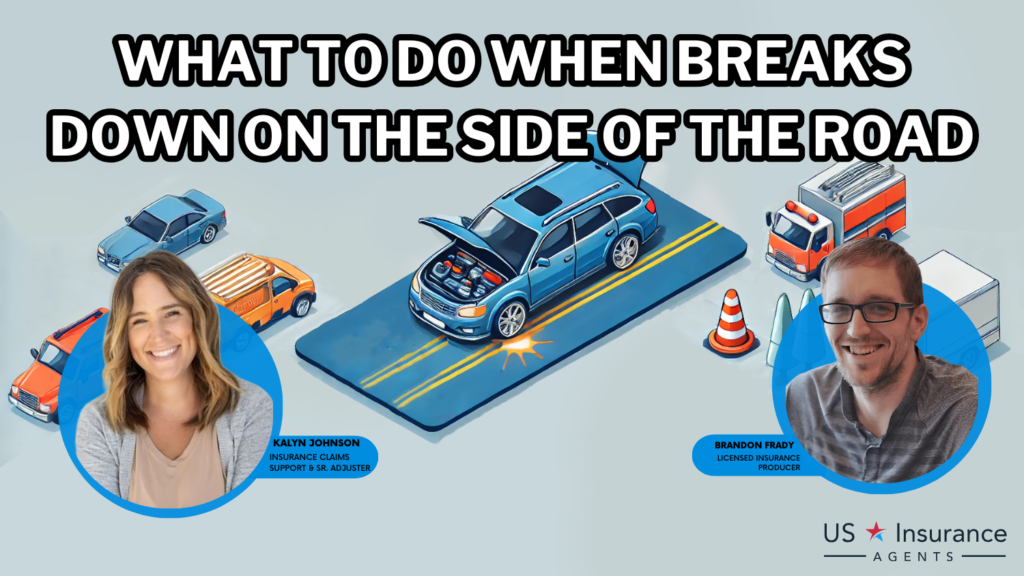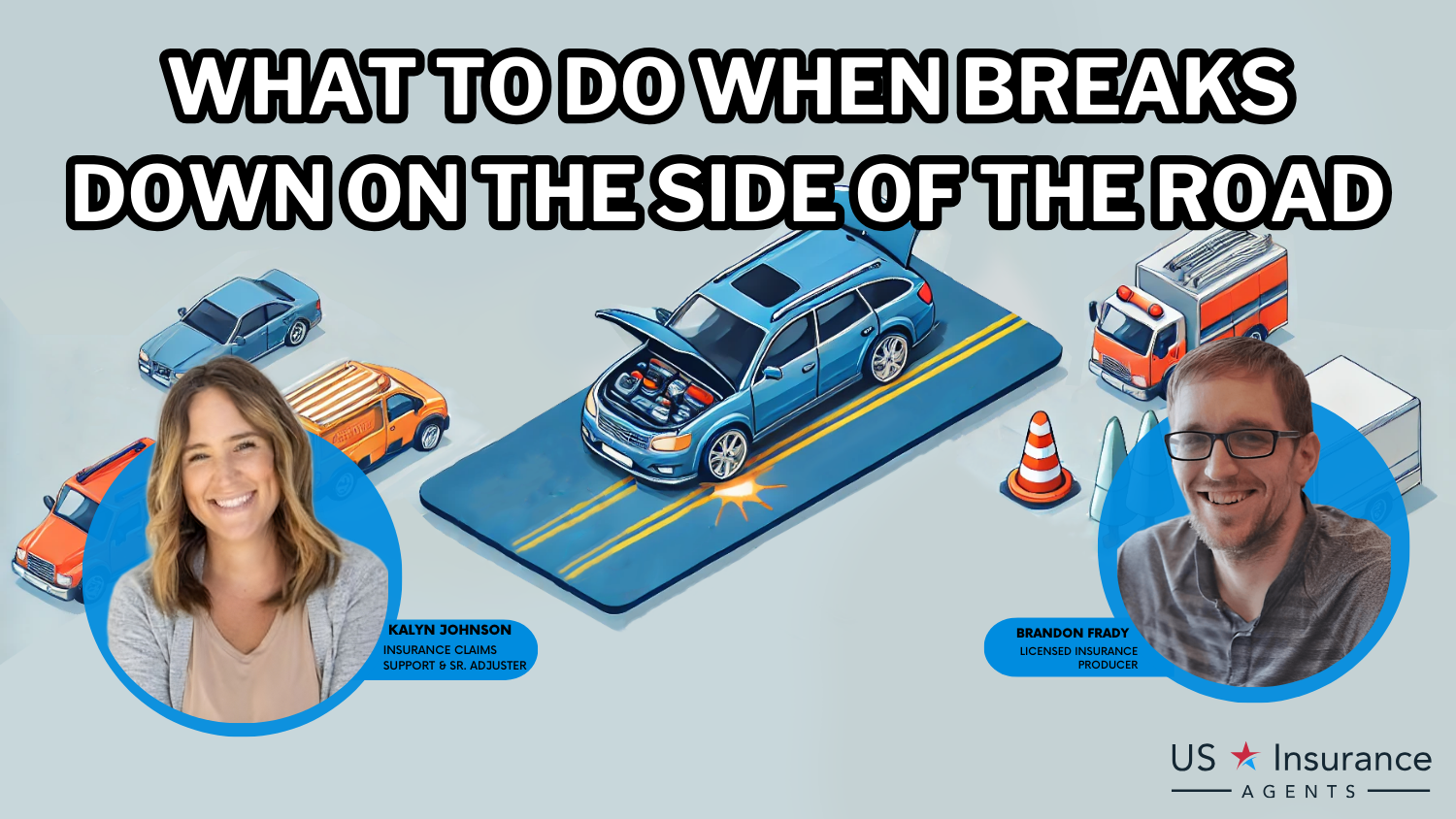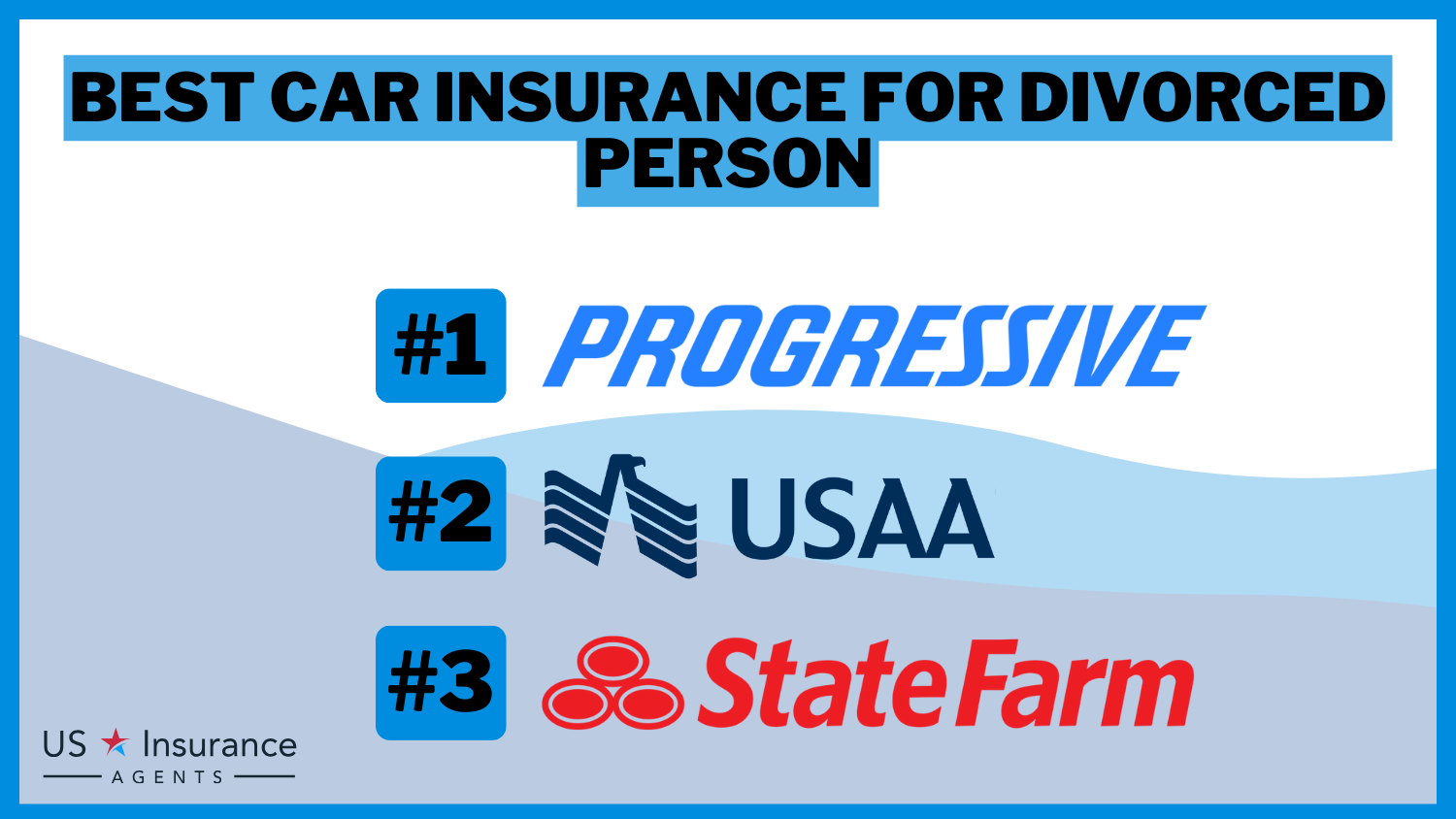What To Do When Breaks Down on the Side of the Road (2026)
Expert Advice for Handling Roadside Breakdowns: Stay Calm, Ensure Safety, and Get Prompt Assistance to Safeguard Your Well-Being, Minimize Disruptions, and Efficiently Resolve the Unexpected Situation on the Road with Confidence and Peace of Mind. Trust in Professional Resources to Guide You Through the Process and Help You Get Back on Track.
Read more Secured with SHA-256 Encryption





Table of Contents
Table of Contents


Insurance Claims Support & Sr. Adjuster
Kalyn grew up in an insurance family with a grandfather, aunt, and uncle leading successful careers as insurance agents. She soon found she has similar interests and followed in their footsteps. After spending about ten years working in the insurance industry as both an appraiser dispatcher and a senior property claims adjuster, she decided to combine her years of insurance experience with another...
Kalyn Johnson


Sr. Director of Content
Sara Routhier, Senior Director of Content, has professional experience as an educator, SEO specialist, and content marketer. She has over 10 years of experience in the insurance industry. As a researcher, data nerd, writer, and editor, she strives to curate educational, enlightening articles that provide you with the must-know facts and best-kept secrets within the overwhelming world of insurance....
Sara Routhier


Licensed Insurance Agent
Brandon Frady has been a licensed insurance agent and insurance office manager since 2018. He has experience in ventures from retail to finance, working positions from cashier to management, but it wasn’t until Brandon started working in the insurance industry that he truly felt at home in his career. In his day-to-day interactions, he aims to live out his business philosophy in how he treats hi...
Brandon Frady
Updated August 2024
Are you prepared for the unexpected? It can happen to anyone—a breakdown on the side of the road, leaving you stranded and unsure of what to do next. In our comprehensive guide, “What To Do When Breaks Down on the Side of the Road,” we cover everything you need to know to handle this situation with confidence.

We delve into key topics such as staying safe, contacting roadside assistance, and efficiently resolving the issue. Don’t let a breakdown ruin your day; empower yourself with knowledge and take control. Enter your ZIP code now to compare rates from the best insurance providers and ensure you have the coverage you need when you need it most.
What steps do I take after my car breaks down?
- Safely Pull Over
Wherever your breakdown occurs, whether it’s on a busy highway or a back road, your first course of action should always be to pull over to the right shoulder. If necessary, it may be a good idea to coast along the road until you’re in an area of high visibility. You should avoid stopping in a curve or by a hill if you are able to do so. - Turn Your Hazard Lights On
Once you have stopped your vehicle and ensured that it is completely out of the flow of traffic, turn on your hazards and leave them running until a tow truck arrives. Turn off and unplug anything else that could run down your car battery since you may have to wait an hour or more for a tow. The only exception here is if it is absolutely necessary to charge your phone. It’s better to run your battery down a little than to be stuck with a dead phone and no way to contact help. - Turn Wheels Towards the Road and Engage Your Parking Break
Next, cut your wheels so that you are turned towards the road and put your parking (emergency) brake on. This will prevent your vehicle from rolling off the roadway if your brakes fail. - Call for Assistance
Use your cell phone to call for help and stay in your car. Although being in a non-running vehicle on the side of a busy road isn’t a safe place to be, being outside of your vehicle is even more dangerous and should be avoided, if possible. - Update Friends or Family
After you have called your motor club provider or a tow truck, try to call a friend or family member to come to sit with you until a tow truck arrives if you are alone at night or in a bad area. Not only will you be safer and less likely to be a victim of a robbery by having someone else with you, but your vehicle will also be easier for the tow truck to find if there are two cars parked on the shoulder instead of one. Be sure to have your friend park in front of you, not behind you. The tow truck will need to pull up behind your automobile in order to load it, so it’s best if nothing is in the way.
On the other hand, if your car breaks down suddenly in the road and you aren’t able to remove it from the roadway, you’ll need to take a slightly different course of action. You will still need to turn on your blinkers to indicate to other drivers that your vehicle isn’t running. Don’t put your park brake on, but stay in your seat with your seatbelt on. Although it may seem counterintuitive to stay in a dead vehicle in the middle of the road, it’s actually safer than getting out of the car. Your vehicle is built to withstand some degree of impact, so as long as another driver slows down before they hit you, you should be okay. Furthermore, if you get out of your vehicle, it’s harder for other motorists to see you, which increases the likelihood that you could get hurt. Plus, you’ll put yourself in danger twice since you will have to cross the roadway to get back to your car when the tow truck arrives. Be safe. Stay in your vehicle.
Free Auto Insurance Comparison
Compare Quotes From Top Companies and Save
Secured with SHA-256 Encryption
How do I use my Motor Club policy for roadside assistance?
If you have a motor club policy, look at your motor club card or key ring for a phone number. There should be a toll-free 1-800 number listed on the card in addition to your policy number. The first thing you will need to do is give the customer service representative your motor club number so they can look up your policy. You may have to verify your personal information such as your phone number, address, vehicle, and birth date. After the motor club rep has verified your identity, you will be asked a few questions about your situation and location. While the first question should be simple to answer, the second may prove to be more difficult.
When you have a breakdown in an unfamiliar area, there are a couple of steps you can take in order to determine exactly where you are. Unfortunately, motor club providers usually want an address and will require more information than just the name of the road you’re on and a mile marker. Of course, if you happen to have GPS in your vehicle, try using that to determine your exact location. However, if you don’t have a GPS, it may still be possible to use an app on your phone to pinpoint where you are. When neither option is feasible, try your best to remember the name of the last road or exit you passed. This information will help your motor club rep find where you are so they can notify a tow truck.
Generally, when you file a motor club claim through your roadside servicer directly, they will pay the towing charge up to a certain amount. It is possible to call a tow truck directly and then submit your towing invoice to the motor club company, but this isn’t always a good idea. Before you go this route, you need to check and make sure that the towing provider you’re going to use is covered under your motor club policy. Although it may seem like every tow service should be covered, this isn’t always necessarily the case. Additionally, some motor club providers will only pay for roadside service on the front end; they won’t reimburse you for paying out of pocket for your tow.
How exactly do I call a towtruck?
For individuals who don’t have a motor club policy or roadside assistance coverage on their car insurance, you will need to call a wrecker or towing service directly. If your vehicle breaks down and you’re far away from home, this might be a little more difficult. How do you find a tow truck to call if you don’t have the phone number for one?
First, try calling 4-1-1 to see if you can get in touch with someone at information, or at least make use of an automated information service. If this doesn’t work, try calling the 1-800 number on your insurance card. It’s a bit of a long shot, but they may be willing to look up the number for a local tow truck if you explain your situation. When both of these options fail you, as a last resort, you can call 911. If you are given an option to speak with the police instead of the emergency dispatcher, choose this selection. Explain your situation and ask for instructions on what to do next.
Once you’ve made contact with the towing company, notified them of your situation, and given your location, you need to discuss payment. Especially if you are in an unfamiliar area, this is extremely important to find out since their pricing may be radically different from what you would expect in your hometown. After being given a price, you’ll need to find out what methods of payment the towing provider will accept. Both of these pieces of information could influence your decision on the location to which the tow truck will take your car.
For instance, if the towing service only accepts cash and will charge $300 to tow you home, you may have to re-think your course of action. Sometimes, the best option is to have your car towed to the closest auto repair shop. Then, find a place to spend the night until they open. It isn’t ideal, but the total cost of a tow, a vehicle repair, and a hotel stay is sometimes cheaper than just getting towed home if you’re hundreds of miles away.
Read more: Best Business Insurance for Auto Repair Shops
After discussing price, payment method, and towing destination, ask your tow provider if there are any other steps you need to take. You may be advised to gather your things together before the truck arrives. Finally, try to be patient while waiting. It could take more than an hour before the nearest tow truck can get to you. Just remember that all the other people who are being helped before you are in basically the same situation and are equally as frustrated.
Safety tips you should remember
Every situation is different, but there are a few general safety precautions you should practice regardless of your particular circumstances.
- Get completely out of the roadway whenever possible.
- Stay in your car especially if you have a break down after dark.
- If you absolutely have to get out of your car, try to go out through the passenger side to avoid getting out in the roadway.
- Never perform work on your car from the driver’s side. It could cost you your life!
- Leave your hazard lights on until the tow truck comes. Just because help is on the way doesn’t mean it’s okay to turn them off.
- If your battery is dead, you may want to hang something white or light-colored out the window to let other motorists know that your car isn’t running.
Being stuck on the side of the road is a scary place to be. Fortunately, if you know what to do in this situation, you can greatly reduce your anxiety when it does happen. Always take precautions and err on the side of being as safe as possible. Be patient and follow whatever directions you are given by the motor club representative or towing service. Before you know it, the whole ordeal will be behind you.
Free Auto Insurance Comparison
Compare Quotes From Top Companies and Save
Secured with SHA-256 Encryption
Case Studies: Breaks Down on the Side of the Road
Case Study 1: Safely Pulling Over
One driver, Jane, experienced a sudden breakdown on a busy highway. Despite the stressful situation, she remembered the importance of pulling over safely. Jane made a conscious effort to steer her vehicle to the right shoulder, ensuring that she was out of the flow of traffic.
By following this crucial step, Jane minimized the risk of further accidents and created a safer environment for herself and other drivers.
Case Study 2: Effective Use of Hazard Lights
John found himself stranded on a back road late at night when his car broke down. Remembering the advice to use hazard lights, he promptly activated them to alert other drivers of his stationary vehicle. John understood that leaving the hazard lights on until the tow truck arrived was essential for maintaining visibility and ensuring his safety.
By taking this precaution, John increased the chances of receiving prompt assistance and avoiding potential dangers.
Case Study 3: Contacting Roadside Assistance
Sarah encountered a breakdown in an unfamiliar area. She followed the recommended steps and used her cell phone to call her motor club provider for assistance. When asked about her location, Sarah provided as much information as possible, including the name of the road and the closest exit.
Despite the initial challenge of pinpointing her exact location, Sarah’s cooperation and resourcefulness helped the motor club representative find her quickly, leading to a timely resolution of the situation.
Case Study 4: Directly Calling a Tow Truck
In a situation where roadside assistance coverage was unavailable, Mark had to call a towing service directly. Mark’s first attempt was to call information services for assistance. When that didn’t work, he contacted the emergency dispatcher via 911. The police provided guidance and directed Mark on the necessary steps.
By diligently following the instructions and maintaining clear communication with the towing company, Mark successfully arranged for his vehicle to be towed to a nearby repair shop.
Case Study 5: Practicing General Safety Precautions
Caroline faced a breakdown situation after dark. She adhered to important safety tips, such as staying in her car and getting out through the passenger side if necessary. Caroline also left her hazard lights on, ensuring that other motorists were aware of her disabled vehicle.
By prioritizing safety and taking precautions, Caroline minimized the risk of accidents or harm while waiting for assistance.

Frequently Asked Questions
What should I do if my car breaks down on the side of the road?
The first step is to ensure your safety by pulling over to the side of the road as far as possible and turning on your hazard lights. If you can safely do so, get out of your car and stand a safe distance away from the vehicle.
Should I call for help?
If you are unable to fix the issue yourself, or if you do not feel safe, it is recommended to call for help. You can call a roadside assistance service or a tow truck.
What information should I provide when calling for help?
Be sure to provide your exact location, the make and model of your car, and a brief description of the issue you are experiencing.
Can I try to fix the issue myself?
If you are knowledgeable and comfortable working on cars, and you have the necessary tools, you can attempt to fix the issue yourself. However, if you are unsure or do not have the proper tools, it is best to call for help.
What should I do while waiting for help to arrive?
While waiting for help, stay in your car with the doors locked and windows rolled up. If you need to exit the car, do so on the opposite side of traffic. It is also important to stay aware of your surroundings and to not accept help from strangers.
Can I move my car before help arrives?
If you are able to safely move your car out of harm’s way, such as to a nearby parking lot or rest area, you can do so. However, if you are unsure or do not feel comfortable, it is best to wait for help to arrive.
Get a FREE Quote in Minutes
Insurance rates change constantly — we help you stay ahead by making it easy to compare top options and save.


